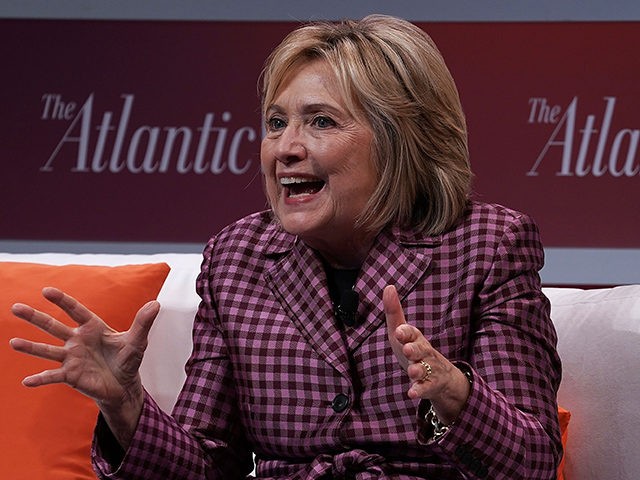Guy Kawasaki, one of Apple’s former marketing chiefs, claims in a recent book that Hillary Clinton’s campaign refused help from the Silicon Valley Masters of the Universe during the 2016 election.
The Daily Mail reports that in his upcoming book Wise Guy, former Apple marketing chief Guy Kawasaki claims that during the 2016 election, Hillary Clinton refused multiple offers of help from Silicon Valley tech executives. Kawasaki claims that he himself reached out on three separate occasions after noticing that the Clinton campaign was failing to utilize social media, an area in which the Trump campaign excelled.
In his book, Kawasaki claims that executives at Microsoft and Facebook told him that they wanted to help the Clinton campaign “above and beyond their job responsibilities,” but the Clinton campaign reportedly ignored these offers in an “attitude akin to hubris.” While the Clinton campaign reportedly did not accept help from these companies, they did accept money. Alphabet, Apple, Amazon, Comcast, Facebook, and Microsoft reportedly collectively donated more than $3.5 million to the Clinton campaign according to Open Secrets.
Kawasaki noted that at one point he attended a Clinton campaign party and attempted to livestream from the event. Kawasaki’s livestreams regularly receive tens of thousands of viewers, which would have been a boost for the Clinton campaign’s online presence, but Kawasaki notes that: “no one was permitted to take selfies or hand his camera to someone on her staff to take photos.”
Kawasaki stated: “I knew one of her volunteers, so I was able to obtain a copy of the photo taken by the staff photographer to use on my social media. I don’t know if most people got a copy, because no one was recording who was in the photos. At the time I figured that this procedure was in the interest of speed. But each group could have handed one phone to a staffer to take a photo at the same time as the staff photographer.”
Kawasaki believes that it was a mistake for the campaign not to embrace social media: “Instead of permitting only a staff photo that people never received, members of the audience that night could have handed their phone to one of the many millennial staffers who were standing around. I assume this procedure as repeated at other appearances, so the lost exposure was easily in the tens of millions.”
In 2018, Kawasaki met with executives from both Microsoft and Facebook where they discussed their efforts to help the Clinton campaign. “Both executives told me that they and their company colleagues were Clinton supporters and had wanted to help above and beyond their job responsibilities,” said Kawasaki. “Both told me the Clinton campaign turned down their offers to help. By contrast, the Trump campaign accepted all the help that was offered by these companies.”
Kawasaki’s final words on the Clinton campaign are quite scathing, writing: “Eat when served. Was it arrogance, shortsightedness, or understandable prioritization that made her campaign turn down the offers of assistance? We’ll never know, but I learned several things from this debacle: If someone with over 10 million followers offers to help you, you should probably accept the help.”
He stated: “If Microsoft and Facebook offer to help, you should accept their help. If there’s anything worse than not getting help when you need it, it’s not accepting help when it’s offered.”
During the campaign, Alphabet Inc. Chairman Eric Schmidt was revealed to have expressed his desire to actively work with the Clinton presidential campaign in documents published by the whistle-blowing organization WikiLeaks. The emails between Clinton campaign chairman John Podesta and campaign manager Robby Mook show that Schmidt met with Podesta and was interested in assuming the role of “head outside advisor.”
“I met with Eric Schmidt tonight,” wrote Podesta. “As David reported, he’s ready to fund, advise recruit talent, etc. He was more deferential on structure than I expected. Wasn’t pushing to run through one of his existing firms. Clearly wants to be head outside advisor, but didn’t seem like he wanted to push others out.” Podesta further pushes Mook to meet with Schmidt, writing, “He’s still in DC tomorrow and would like to meet with you if you are in DC in the afternoon. I think it’s worth doing. You around? If you are, and want to meet with him, maybe the four of us can get on the phone in the am.”
Schmidt was also instrumental in the formation of “The Groundwork”, an online startup company that aimed to place Hillary Clinton in the white house. The Groundwork was the highest paid tech service company to the Clinton campaign, receiving $136,131 during the third quarter and $313,349 through the first 9 months of 2015.
Michael Slaby, the CEO of The Groundwork, also served as the Chief Technology Officer for President Barack Obama’s 2008 campaign, stated, “We’re not trying to obfuscate anything, we’re just trying to keep our heads down and do stuff.” Schmidt also worked closely on Obama’s 2012 reelection campaign with Obama lieutenant David Plouffe, who stated that Schmidt, “helped recruit talent, choose technology and coach the campaign manager, Jim Messina, on the finer points of leading a large organization.” Breitbart News has reported on this extensively here.

COMMENTS
Please let us know if you're having issues with commenting.